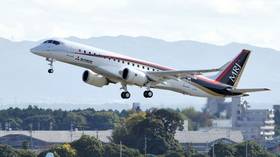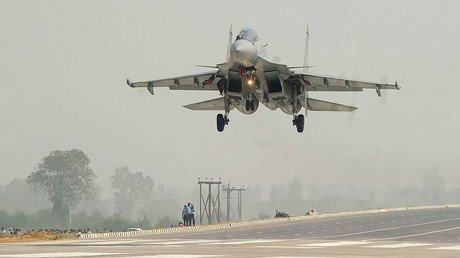Japan’s Mitsubishi to join global airliner challenge to Boeing and Airbus

The aviation unit of Japanese industrial giant Mitsubishi is planning to start deliveries of Japan's first homegrown passenger plane since the 1960s as soon as next year.
The 88-passenger jet has a flight range of about 2,000 miles, while a smaller variant can fly up to 76 people for about the same distance. The MRJ (Mitsubishi Regional Jet) made its maiden flight in November 2015 with the first deliveries slated for mid-2020.
Mitsubishi Aircraft Corporation initially planned the first deliveries of the jet for 2008. However, the date was pushed back five times due to production difficulties. Orders for the aircraft that once totaled 474 units from US and Japanese carriers have been reportedly reduced to 407 jets so far.
The Japanese conglomerate, a longtime supplier of aircraft components to Boeing, invested over 600 billion yen ($5.36 billion) into MRJ as of March 2018 with another 200 billion yen ($1.8bn) expected to be pumped into the project by the end of 2020. In October, Mitsubishi announced plans to invest an extra 170 billion yen ($1.5bn) in capital into its aircraft unit, canceling 50 billion yen ($446mn) of the debt owed by the division.
The long-anticipated MRJ, which is designed for local air transportation, may become a peer competitor for such mainstays as Canada's Bombardier, whose C Series regional planes are marketed as the Airbus A220, after the 2017 acquisition of the unit by the European aerospace giant. The Japanese jet is also expected to provide keen competition to Brazil's Embraer that announced plans to create a joint venture for Embraer's airliners in 2018.
The newcomers in the sector of regional air service, such as the Russian Sukhoi Superjet-100 and the Chinese Comac ARJ21, which are currently undergoing test flights, may also challenge Airbus and Boeing.
Mitsubishi is currently involved in legal proceedings with Montreal–based Bombardier. In October, the Canadian aircraft manufacturer filed a lawsuit, accusing the Japanese corporation of stealing secret information and causing Bombardier “to suffer irreparable financial loss.”
Mitsubishi counter-sued, saying that the Canadian aircraft producer had violated antitrust regulations through “a multifaceted scheme to expand its power within the regional jet market by impeding the entrance of a new competing aircraft.”
For more stories on economy & finance visit RT's business section














